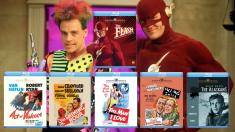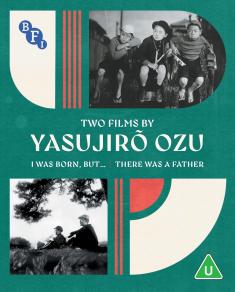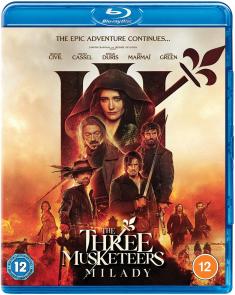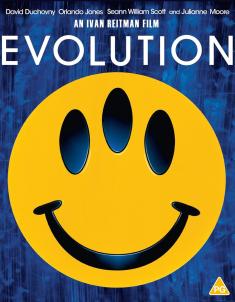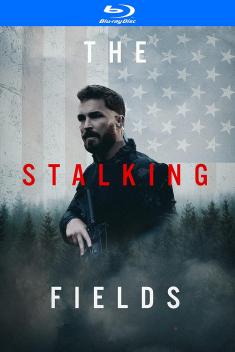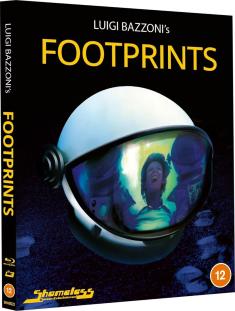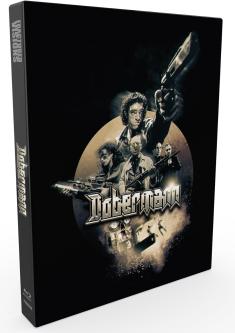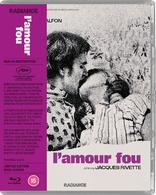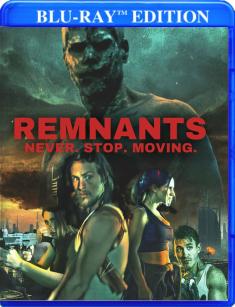Inland Empire (UK Import)
Overview -
In a series of reviews and blog posts filed under the heading "Auteur Theory," I have made it a project to revisit the career of cult director David Lynch, rewatch his entire feature filmography in sequential order, and chart the progression of this iconoclastic artist through both his highs and lows.
"Auteur Theory" Article Index
- 1977: 'Eraserhead' (UK Import Blu-ray)
- 1977: 'Eraserhead' (Japanese Import Blu-ray)
- 1980: 'The Elephant Man' (French Import Blu-ray)
- 1984: 'Dune' (UK Import Blu-ray)
- 1984: 'Dune – Extended Edition' (German Import Blu-ray)
- 1986: 'Blue Velvet' (UK Import Blu-ray)
- 1990: 'Twin Peaks: Pilot Episode' (VUDU)
- 1990: 'Wild at Heart' (UK Import Blu-ray)
- 1990: 'Wild at Heart' (French Import Blu-ray)
- 1990: 'Industrial Symphony No. 1: The Dream of the Brokenhearted' (DVD)
- 1990: 'American Chronicles' (VHS)
- 1992: 'Twin Peaks: Fire Walk With Me' (UK Import Blu-ray)
- 1992: 'Twin Peaks: Fire Walk With Me' (Japanese Import Blu-ray)
- 1992: 'On the Air' (Laserdisc)
- 1993: 'Hotel Room' (Laserdisc)
- 1997: 'Lost Highway' (Japanese Import Blu-ray)
- 1997: 'Lost Highway' (UK Import Blu-ray)
- 1999: 'The Straight Story' (Japanese Import Blu-ray)
- 2001: 'Mulholland Drive' (French Import Blu-ray)
- 'David Lynch: Images' (Book)
- 'Wild at Heart' Deleted Scenes
- 'The Secret Diary of Laura Palmer' (Book)
- 'The Autobiography of F.B.I. Special Agent Dale Cooper' (Book)
- 'Diane… The Twin Peaks Tapes of Agent Cooper' (Audiobook)
Storyline: Our Reviewer's Take
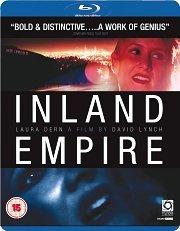
"Something's wrong. Bad wrong."
Ever since I started this David Lynch marathon, I've dreaded the day that I would come to the director's last feature film, 'Inland Empire'. Not only does this bring an end to my journey through his fascinating career, but frankly, the movie's just so awful that I didn't want to sit through it again. At three full hours, it's also Lynch's longest film by far. Watching it is like torture, and doing so after revisiting his entire body of work only makes me incredibly sad for the loss of such a great talent.
Yes, I realize that what I just wrote may sound a little dramatic. So, the guy made one bad movie. It happens. He hasn't died. Couldn't he come back with something better? I'd like to hope so, but the fact is that 'Inland Empire' represents the culmination of Lynch's steep artistic decline in the years following 'Mulholland Drive'. I may have had some quibbles with that previous movie, but it's still a strong work by a vital filmmaker. Yet, despite its acclaim and success, rather than capitalize on his latest career resurgence, Lynch retreated from filmmaking for several years and set up a personal web site where he could devote himself to short, experimental content for paid subscribers. Unfortunately, in doing so, he got lost in his own head, and almost everything he produced during this period was pointless, unwatchable drivel. Soon, even longtime fans fled, and he was left with none but the most die-hard of apologists and sycophants to reaffirm his artistic relevance until he could scrape together enough resources to make a new movie completely outside the studio system, beholden to no one except his own impulses and whims.
'Inland Empire' reunites Lynch with his 'Blue Velvet' and 'Wild at Heart' star Laura Dern. At least at first, she plays a once-successful actress named Nikki Grace, who has just landed an important comeback role in a prestigious Oscar-bait drama called 'On High in Blue Tomorrows'. As production starts, she learns that the film actually has a troubled history. The project is rumored to be cursed because a previous attempt to shoot the script led to murder and madness. The more she works on it, Nikki's reality starts to break down, and her identity fragments into a series of scenes where she seems to play multiple different characters, including a Southern belle, an abused housewife and a junkie whore. The distinction between these characters blurs, as does our understanding of which is the real woman.
The director's fans will recognize these as themes regurgitated from his 'Lost Highway' and 'Mulholland Drive'. I think that I've just described its premise more coherently than anything in the movie itself. In practice, the film plays like the last ten minutes of 'Mulholland Drive' stretched out to three tedious hours, without any of the context, compelling characters or intriguing story ideas that the earlier picture built up in its first half. It's just an assemblage of random scenes, some of which (including the recurring appearance of people who dress in rabbit costumes and recite nonsense dialogue) that originally appeared as web shorts created with no intention of building a story around them.
It would be easy to crack a joke here that David Lynch has always been crazy. Just look at his movies, right? The man must be pretty nutty to dream up something like 'Eraserhead'. Ha ha, what a weirdo. Of course, that's a terribly simplistic and reductive view. Lynch is a Surrealist. His work until now, while often avant-garde and (for lack of a better word) strange, always had form, purpose and meaning, even if they required active viewer participation to interpret. That hasn't been the case in recent years. Lynch seems to have lost interest in such things. His newer work consists almost exclusively of incoherent rambling and dumb in-jokes that only Lynch and his acolytes understand or find amusing, compiled with no form or structure. It's wearying to watch.
Certainly one of the biggest factors in the director's decline has been his forsaking of the film medium in favor of digital video. At some point, Lynch picked up an inexpensive prosumer camera and became obsessed with the freedom it offered him. No longer did he need to spend a lot of time or money setting up and lighting scenes. His camera's picture quality may look like garbage, but he's rationalized that to be a fair trade-off for the ability to shoot anything he wants whenever he wants, at a moment's notice and with little effort or expense.
 |
The problem is that his work now looks like he's wasted little effort or expense on it. 'Inland Empire' is a cheap, ugly movie. It looks like it was made by a high school kid playing around with his parents' camcorder. It's embarrassingly amateurish. Scenes are poorly lit and staged, and Lynch uses the camera's flexibility to do goofy things, like shoving the lens right up to his actors' noses, or shooting a scene of two women drinking tea from the perspective of the cups. It's jokey and inane.
Most artists understand that being forced to work with certain limitations or restrictions can actually help to clarify their work. In a 1985 interview about his movie 'Dune', Lynch was asked about being limited to a PG rating. He answered at the time: "I personally love restrictions, because it forces you to create in kind of like boundaries. And maybe you think of neat ideas because of these restrictions." With 'Inland Empire', however, Lynch has no restrictions at all, either technically or from studio oversight. He simply has too much freedom now, and that has caused him to lose all perspective on his work.
One of the movie's greatest tragedies is that Laura Dern is actually quite excellent in it. Prior to this, Dern hadn't been featured in a significant starring role since 1996's 'Citizen Ruth'. She obviously trusted her director, and poured her all into a tremendous performance (really, several distinct performances). Sadly, all of that effort is ultimately wasted, as are other decent turns by Justin Theroux as Nikki's philandering co-star and Jeremy Irons as her pretentious director. Lynch regulars Grace Zabriskie and Harry Dean Stanton have needless supporting roles. Dern's mother and 'Wild at Heart' co-star Diane Ladd pops in for a brief cameo, along with, of all people, William H. Macy. Most of the rest of the cast, however, are either amateurs or incompetents.
During its three-hour length, 'Inland Empire' has a small handful of moments with effective Lynchian moods, but these are undercut by countless stupid scenes (including a dance number where a gaggle of porn starlets perform "The Loco-Motion") that play like bad parodies of David Lynch set-pieces. In fact, at the very end of it all, Lynch seems to reveal his true intentions with an end-credits sequence that openly mocks many familiar images from his previous movies. It turns out that the whole thing has just been a cruel practical joke that the director played on his fans. Shame on him. What a waste of time it is to watch this crap.
 |
In the United States, 'Inland Empire' was released on DVD back in 2007 by Rhino Home Video, distributing for David Lynch's Absurda label. Neither Rhino nor any other studio has bothered to port the content to the Blu-ray format yet because, frankly, there doesn't seem to be much point in it. Over in the UK, however, Optimum Home Entertainment felt more optimistic about the prospects of upconverting the movie's crummy standard-def video to high definition. The Blu-ray under review here was released in 2010. The disc is locked to Region B playback and will require a compatible Blu-ray player to operate. The disc will not function in a standard American Blu-ray player without a region code modification. The bonus features on the disc are also encoded at 1080i resolution at 50 Hz.
Like many Blu-rays from the UK, the disc comes packaged in an extra-thick keepcase. The three-hour movie has not been encoded with any chapter stops or a Scene Selections menu.
Video Review

I'm not going to mince words here. This Blu-ray looks like ass. Most of that is David Lynch's fault and is endemic to the movie, not a Blu-ray transfer flaw. Lynch shot the entirety of 'Inland Empire' on standard-definition video using a prosumer Sony camcorder. I won't pass judgment on the quality or capabilities of the camera itself. I'm sure that it's very possible for someone to shoot decent-looking SD footage using this camera with the proper know-how and preparation. (Lighting the shots might help a little.) Sadly, that person is not David Lynch. From the results, he might as well have shot the thing on a cell phone. No, that's not fair. I've seen cell phone video that looks a lot better than this.
The Blu-ray's upconverted 1080p/AVC MPEG-4 video has basically everything wrong with it. The picture is soft, smeary and poorly-detailed. It suffers severe jaggies, banding, posterization and edge ringing artifacts. Because Lynch likes to shoot in low-light even though he's not using a camera designed for that purpose, the image is also incredibly noisy, and that noise frequently moves in weird, unnatural patterns.
David Lynch will no doubt argue that, even though the movie fails every objective measure that we typically use to quantify a film's photography, he finds the image's textures fascinating and perhaps even beautiful. That's certainly his prerogative as an artist. However, as a viewer, I'm under no obligation to agree with him, and I don't. The movie's ugly, and it's the sort of ugly that serves no artistic purpose that I can discern. It just looks amateurish and incompetent.
I thought that I still had the DVD edition of the movie in my collection somewhere, but apparently I got rid of it at some point. I recall hoping that the Blu-ray's upconversion and superior encoding could offer some improvement over the DVD's terrible jaggies and compression artifacts. The jaggies and aliasing are still here, so those problems must be baked into the photography. Unfortunately, I can't make a direct comparison to determine whether the compression is any better. Honestly, would it really matter? The movie's still hideous.
Audio Review
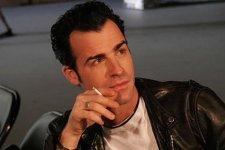
Lynch may have lost his marbles when it comes to photography, but he still knows a thing or two about sound design. Like most of the director's movies, 'Inland Empire' has a pretty great soundtrack, and the high-resolution encoding on the Blu-ray is a legitimate selling point over DVD.
The disc offers the track in both lossless DTS-HD Master Audio 5.1 format and uncompressed PCM stereo. As I've mentioned in previous reviews, Lynch has forsaken the idea of surround sound in recent years and only mixes his soundtracks in the front channels anyway. For this review, I watched the entire movie using DTS-HD MA 5.1. The surround channels never came on once. I later sampled some scenes in PCM stereo and didn't detect much difference. The soundtrack is frequently very loud and has a lot of dynamic range, so I would tend to favor the 5.1 option for its dedicated LFE channel. Fidelity is excellent, with terrific clarity in even subtle details.
On the downside, Lynch couldn't get his usual musical collaborator Angelo Badalamenti to compose a score for 'Inland Empire'. I'm not sure if they had a falling out, of if Badalamenti was just busy. Whatever the reason, Lynch did the music himself, and it's mostly a lot of monotonous low-end droning. That's not the Blu-ray's fault, of course.
Special Features

The bonus features on the disc are all encoded at 1080i resolution at 50 Hz. Most are upconverted from standard definition. The Mike Figgis and Cartier Foundation interviews also appear on the UK and French Blu-ray editions of 'The Elephant Man'.
- Guardian Interview at the National Film Theater with David Lynch (SD, 17 min.) – Lynch blathers about his obsession with Transcendental Meditation. Viewers watching can marvel at what a nutbag he's turned into.
- A Short Interview in London (HD, 6 min.) – The director explains why he loves crummy digital video so much. He also talks about Hollywood, Laura Dern, dreams, where his ideas come from, and marketing 'Inland Empire' by walking around Hollywood with a cow. (Yes, that really happened.)
- A Conversation with David Lynch by Mike Figgis (SD, 20 min.) – In this interview by pretentious indie director Mike Figgis ('Leaving Las Vegas', 'Timecode'), Lynch unleashes some philosophical ramblings about the nature of filmmaking (none specific to this movie) and once again goes on a diatribe about the benefits of digital video. He describes film as, "death, death, death."
- A Masterclass with David Lynch (SD, 26 min.) – At a discussion panel in Paris, Lynch openly admits that 'Inland Empire' was shot with "low grade, bad DV." He seems amused by this, but looks bleary-eyed and only half-conscious for most of the interview. Much of the length of this piece is spent waiting for a translator to repeat questions to him and repeat his answers to the audience.
- Interview at the Cartier Foundation (SD, 15 min.) – At a Paris art exhibition in 2007, French composer and film theorist Michel Chion interviews Lynch about his paintings and his early film work, primarily his short subject 'The Alphabet'. Chion is practically a gushing fan.
- Trailer (SD, 2 min.) – At just under two minutes, this upconverted trailer is about as much 'Inland Empire' as I can take.
The Cutting Room Floor: What Didn't Make the Blu-ray?
The Blu-ray does not include any of the supplements that came with the DVD edition of 'Inland Empire'. These include a still gallery, behind-the-scenes footage, more trailers, an interview about Lynch's 'Rabbits' web series, a cooking demonstration (I have no idea either), out of focus footage of a ballerina, and more than an hour and a quarter of deleted scenes called "More Things That Happened" (as if you could possibly want more of this movie).
I've been a David Lynch fan for a long time. Even after my initial disappointment with it when it was first released, I honestly tried to revisit 'Inland Empire' for this marathon with as much of an open mind as I could muster. It didn't help. The movie is a completely worthless, infuriatingly awful piece of shit. I can't recommend it to anyone but the director's most ardent apologists.
In addition to being locked to Region B, this UK Blu-ray can't do much to make the movie's lousy standard-def photography look any better than it is. For whatever it's worth, the disc has good audio.
Skip it, and be glad that you did.
